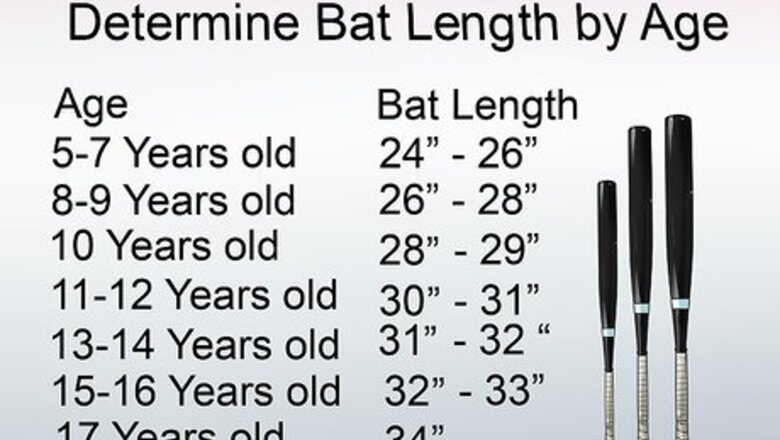
views
Selecting the Right Bat Size
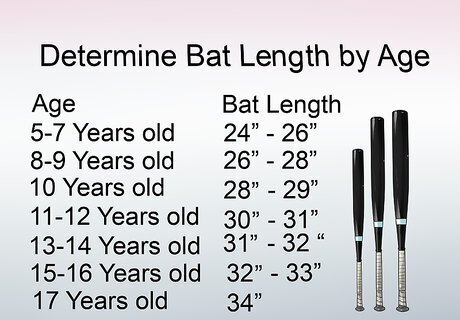
Consult a softball bat size chart. This will give you a general idea of the size range you are looking for. Most sporting goods stores can provide sizing charts, which can help you determine the right length or weight range for a bat based on your child’s height, weight, and age.
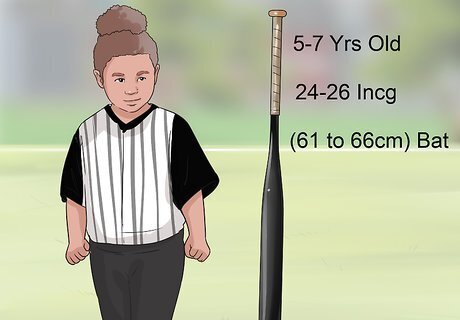
Determine bat length range by using the girl's age. You can get a good ballpark estimate of how long your bat should be based on your child’s age. These estimates are based on the average height and weight of children in a particular age range, and so will only give you a range and not a specific length. For example, in fastpitch softball, a child 5 to 7 years old would use a 24- to 26-inch (61 to 66 cm) bat, 8 to 9 years old would use a 26- to 29-inch (66 to 74 cm), and so on. For each year older, add approximately 1 inch (2.54 cm) to the bat length as a general rule. If the girl you are buying a bat for is exceptionally large or small for her age, you may need to select a bat outside of the expected size range for her age group.
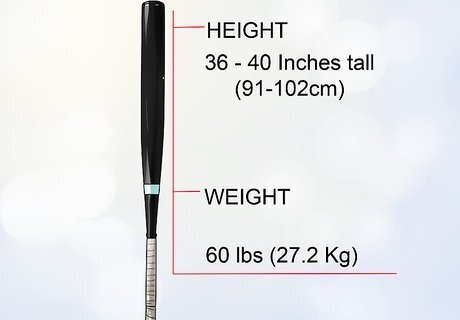
Narrow down the bat length based on the girl’s height and weight. For example, if she weighs less than 60 lbs. (27.2 kg) and is 36-40 inches tall (91-102 cm), she should probably use a bat that is about 26 inches (66 cm) long.
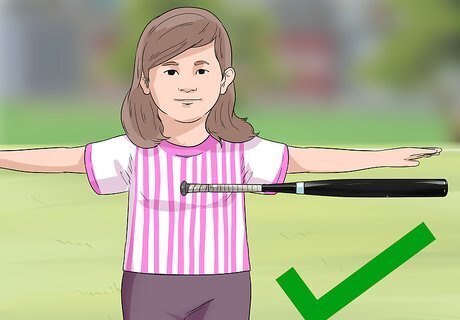
Check the bat length by measuring it against the girl’s body. Once you have selected a bat that you feel is in the right length range, try several measurements to make sure the length is appropriate and comfortable. Have the girl extend one of her arms straight out to the side, at shoulder level. Place knob of the bat at the center of her chest and align the bat along her arm, with the end toward her fingertips. If she can comfortably touch the end of the bat with her fingertips, it is probably about the right length. Place the knob of the bat in the center of her chest and hold the bat so it is extended straight out in front of her. Ask her to reach out and grab the barrel (widest part) of the bat. If she can do so comfortably, the bat is probably about the right length. Stand the bat up vertically against her leg while she is standing up straight. A bat of the right length should come up to about mid-hip level.
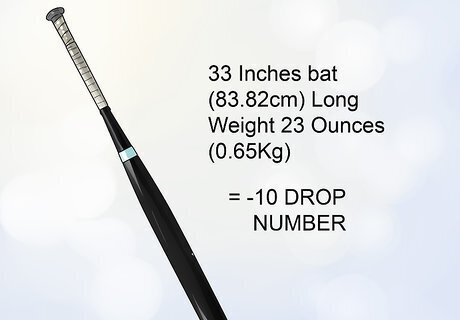
Determine the appropriate bat drop based on the girl’s age range. Softball bat weight is sometimes described in terms of “drop,” which is the difference between the bat’s length (in inches) and weight (in ounces). For example, a bat that is 33 inches (83.82 cm) long and weighs 23 ounces (0.65 kg) has a drop of -10. The smaller the drop number, the higher the bat’s weight relative to its length. A bat that is 34 in (cm) long and weighs 26 oz (kg) would have a drop of -8. In general, children under 10 will be most comfortable using bats with a drop of -13.5 to -10, while older children may be comfortable with a drop as small as -8. If the girl is exceptionally small or large for her age, you may need to adjust the bat drop accordingly.
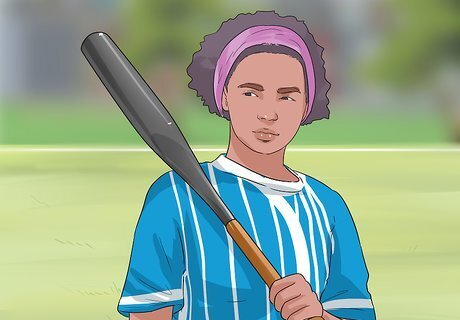
Determine the correct bat weight based on the girl’s personal preference. The weight of the bat should ultimately be determined by what is comfortable for the girl and what her playing style is like. Longer, lighter bats will allow for faster hits, while shorter, heavier bats deliver more powerful hits. Ask the girl to hold the bat out in front of her with one hand and swing it back and forth. If she is unable to do so without dropping it, the bat is probably too heavy for her. Consult your coach or a specialist at your sporting goods store if you have any concerns about selecting the right weight.
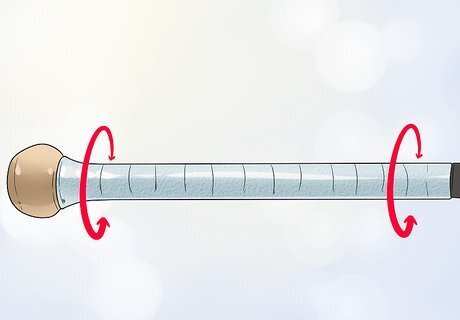
Choose the handle diameter according to the girl's preference. All bats are tapered at the handle, but the diameter can vary. Some children prefer a smaller handle, especially if they have small hands. A smaller handle provides for a quicker wrist rotation when swinging the bat. However, a thicker handle can reduce the vibration or sting that comes from not hitting the ball in the correct area of the bat ("sweet spot"). Make sure the handle’s diameter and materials conform to your team’s requirements.
Following Your Team’s Equipment Requirements
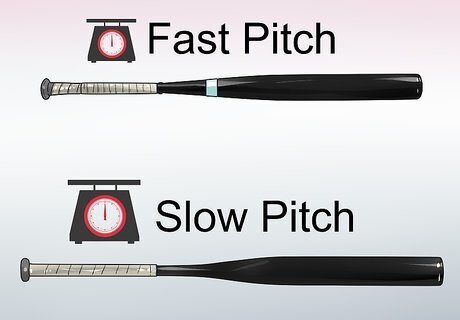
Determine whether you need a fastpitch or slowpitch bat. The two common types of softball – slowpitch and fastpitch – require different types of bats. In general, slowpitch softball requires heavier bats, while fastpitch requires lighter bats. Before you select a bat, make sure you know which type of softball game it will be used for.
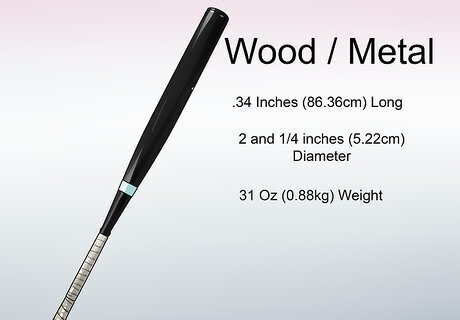
Find out if your team has special size or material requirements. Some softball teams or leagues require bats that conform to certain size restrictions or are composed of specific materials (e.g. wood vs. metal or composite). For example, the United States Specialty Sports Association (USSSA) requires that a slowpitch softball bat must be no more than 34 inches (86.36 cm) long, 2 and ¼ inches (5.72 cm) in diameter, and 31 oz. (0.88 kg) in weight. They also have requirements regarding the construction of the bat, e.g. that the knob on the end of the bat must be welded on or mechanically attached. Before purchasing a bat, consult the league or team handbook for equipment regulations, or ask the team’s coach.
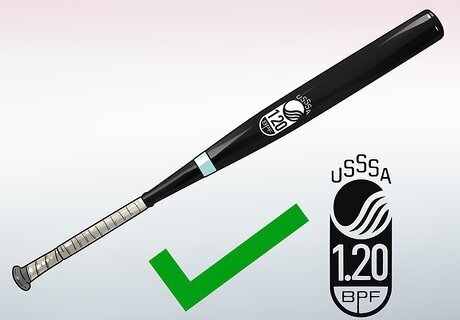
Find out about any other requirements or regulations. Some leagues or teams require that bats bear particular markings – for example, graphics indicating that the bat is approved by a particular sports association, or an indication of the BPF (bat performance factor). They may also require that the bat be decorated or colored in a particular way. Your team or league may also have regulations regarding the modification of bats (e.g. adding tape or a grip sleeve to the handle).
Choosing the Right Bat Composition
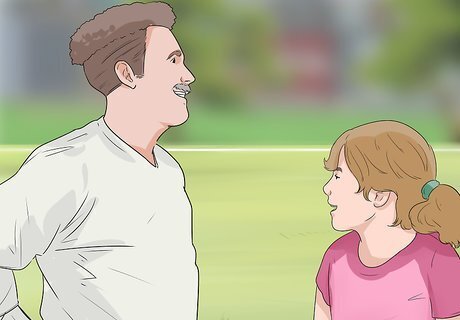
Consult your coach about the right type of bat to buy. Different bat compositions and materials have different uses and advantages. It’s important to know what kind of bat is appropriate for the game the girl will be playing.
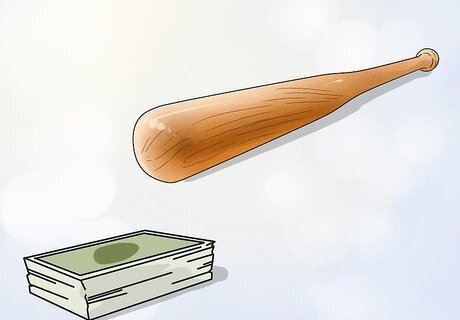
Buy a wood bat for practice, tournaments, or professional games. Wood bats are generally heavier than other types on the market. They may be most appropriate for slowpitch softball and for professional games and tournaments. Some leagues mandate the use of wood bats for safety reasons, since balls hit with wood bats are less likely to attain speeds that can result in serious injury to defensive players and pitchers.
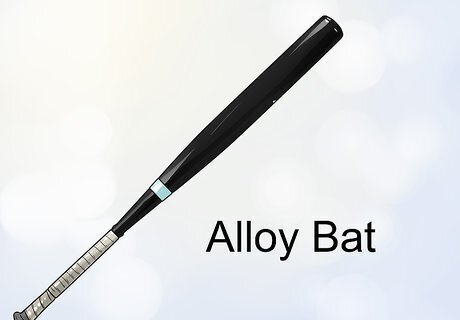
Choose an alloy bat for lightness, durability, and affordability. Alloy bats (made from aluminum or other types of metal) are light and relatively inexpensive. They also have the advantage of being ready to use right away – i.e., they do not have to be broken in. They also tend to last longer than other types of bats. However, they have a smaller “sweet spot” than other types of bats, meaning that there is a more restricted area of the barrel for creating a good hit.
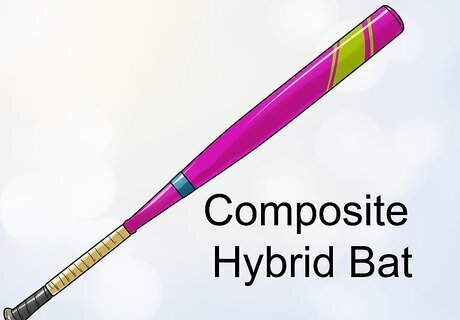
Choose a composite or hybrid bat for good balance and high performance. Composite bats are made out of a synthetic, fibrous material. These bats tend to be more well-balanced than other types, and are better at absorbing vibrations from hits. However, they tend to be more expensive than alloy bats, and have to be broken in. Hybrid bats combine features of alloy and composite bats. A hybrid bat offers the comfort of a shock-absorbing composite handle along with the lower cost of an alloy barrel. Be aware of the potential safety risks to other team members posed by composite bats. The higher ball speeds achieved by composite bats have the potential to cause serious injury to pitchers and defensive players.
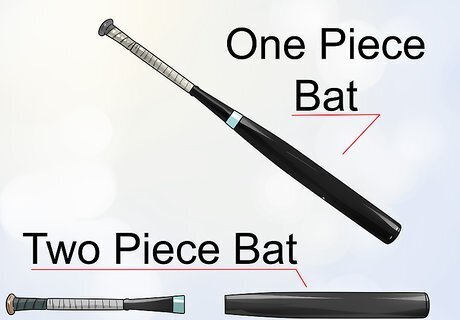
Decide between a one-piece or a two-piece bat. As the names suggest, one-piece bats are made of a single piece of material, while two-piece bats consist of a separate barrel and handle, sometimes made from two different materials, that have been assembled together. Once piece bats tend to be stiffer and better balanced, while two-piece bats are more flexible and better at absorbing shocks and vibrations. You should choose based on the girl’s playing style and personal preference. Have the girl test out both types of bat on the field before making a purchase. She may be able to borrow bats from other team members in order to test them out and see which type she likes best.

Keep your budget in mind. The price of bats varies depending on materials, method of composition, and a variety of other factors. While you may be able to get a high-quality composite bat for around $100, softball bats may cost as much as $400. Have an idea of how much you are able to spend before you decide to purchase a bat, and speak to store employees about your price expectations.




















Comments
0 comment